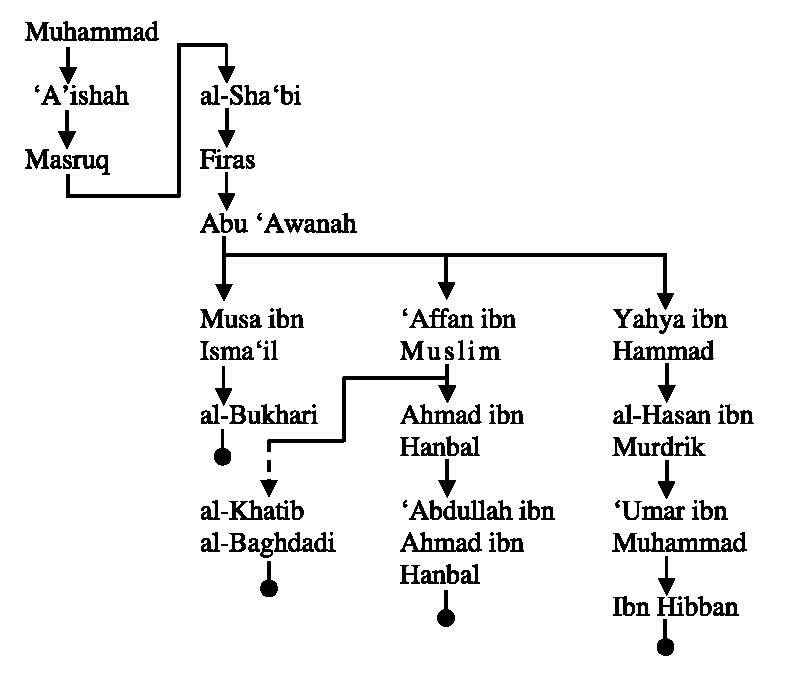Narrative on
“Long Hands”
Dr Shehzad
Saleem
حدثنا مُوسَي بن إِسْمَاعِيلَ حدثنا أبو
عَوَانَةَ عن فِرَاسٍ عن الشَّعْبِيِّ عن مَسْرُوقٍ عن عَائِشَةَ
رضي اللّٰه عنها اَنَّ بَعْضَ اَزْوَاجِ النبي صلي اللّٰه عليه
وسلم قُلْنَ لِلنَّبِيِّ صلي اللّٰه عليه وسلم أَيُّنَا
أَسْرَعُ بِكَ لُحُوقًا قال اَطْوَلُكُنَّ يَدًا فَاَخَذُوا
قَصَبَةً يَذْرَعُونَهَا فَكَانَتْ سَوْدَةُ اَطْوَلَهُنَّ يَدًا
فَعَلِمْنَا بَعْدُ اَنَّمَا كانت طُولَ يَدِهَا الصَّدَقَةُ
وَكَانَتْ اَسْرَعَنَا لُحُوقًا بِهِ وَكَانَتْ تُحِبُّ
الصَّدَقَةَ
Masruq reported
from ‘A’ishah (rta) that one of the wives of the Prophet (sws)
said to me: “Which of us would meet you first?” He replied:
“One who has the longest hands.” The wives started to measure
the hands with stick of sugar cane. They found that Sawdah had
the longest hands. So we got to know later that the expression
her long hands means referred to her being charitable and she
was the first one who [died and] went to the Prophet (sws) the
foremost and she was very fond of charity.
Following is
the schematic illustration of the variants of this narrative’s
isnad:

It is factually
wrong that Sawdah (rta) was the first among the wives of the
Prophet (rta) to have died. It is evident from other sources
that it was Zaynab bint Jahash (rta):
حدثنا حماد أبو أسامة قال حدثني عامر قال
حدثني عبد الرحمن بن أبزى قال صليت مع عمر علي زينب وكانت أول
نساء النبي صلي الله عليه وسلم ماتت بعد النبي صلى الله عليه
وسلم
‘Abd al-Rahman
ibn Abza stated: “I offered the funeral prayer of Zaynab with
‘Umar and she was the first of the Prophet’s wives who died
after him.”
Thus it is
recorded that she died in 20 AH.
Moreover, it is
about her that sources specify that she was very charitable:
حدثنا مَحْمُودُ بن غَيْلَانَ أبو
أَحْمَدَ حدثنا الْفَضْلُ بن مُوسَى السِّينَانِيُّ أخبرنا
طَلْحَةُ بن يحيى بن طَلْحَةَ عن عَائِشَةَ بِنْتِ طَلْحَةَ عن
عَائِشَةَ أُمِّ الْمُؤْمِنِينَ قالت قال رسول اللَّهِ صلى الله
عليه وسلم اسرعكن لَحَاقًا بِي اطولكن يَدًا قالت فَكُنَّ
يَتَطَاوَلْنَ أَيَّتُهُنَّ أَطْوَلُ يَدًا قالت فَكَانَتْ
اطولنا يَدًا زَيْنَبُ لِأَنَّهَا كانت تَعْمَلُ بِيَدِهَا
وَتَصَدَّقُ
‘A’ishah bint
Tlhah reports from ‘A’ishah, mother of the faithful that she
stated that the Prophet (sws) said: “The foremost among you to
meet me is the one who has the longest hands.” At this she
said that the wives started to measure their hands to know who
had the longest ones and then said: “Zaynab had the longest
hands among us because she used them and would give charity.”
Though Ibn Abi
Khaythamah says that Sawdah bint Zam‘ah (rta) died near the
end of ‘Umar’s caliphate,
al-Waqidi and Ibn Hibban say that she died in 55 AH.
The only
person to report the name of Sawdah (rta) in this narrative
from ‘A’ishah is Masruq ibn Ajda‘.
Moreover,
besides ‘A’ishah bint Tlhah (as cited above by Muslim), ‘Amrah
bint ‘Abd al-Rahman also reports from ‘A’ishah that the first
to die after the Prophet (sws) was Zaynab:
أخبرنا إسماعيل بن عبد الله بن أبي أويس
حدثني أبي عن يحيى بن سعيد عن عمرة بنت عبد الرحمن الأنصارية عن
عائشة قالت قال النبي صلى الله عليه وسلم لأزواجه يتبعني
أطولكن يدا قالت عائشة فكنا إذا اجتمعنا في بيت إحدانا بعد
النبي صلى الله عليه وسلم نمد أيدينا في الجدار نتطاول فلم نزل
نفعل ذلك حتى توفيت زينب بنت جحش وكانت امرأة قصيرة يرحمها الله
ولم تكن أطولنا فعرفنا حينئذ أن النبي صلى الله عليه وسلم إنما
أراد بطول اليد الصدقة قالت وكانت زينب امرأة صناع اليد فكانت
تدبغ وتخرز وتتصدق في سبيل الله
‘A’ishah stated
that the Prophet (sws) said to his wife: “The one to follow me
would be the one who has the longest hands.” ‘A’ishah said:
“Once we were gathered at the houses of one among us after the
Prophet (sws) had passed away. We would spread our hands on
the wall to find out which among us has the longest ones. We
would continue to do this until Zaynab bint Jahash died and
she was a woman of short hands. It is then we realized that by
the length of hands the Prophet (sws) was actually referring
to being charitable. Zaynab would work with her hands, bake
hides and stitch them and spend in charity.”
It seems that
in the narrative cited earliest in this article, the error has
been made by Abu ‘Awanah Waddah ibn ‘Umar al-Yashkuri about
whom Abu Hatim says that he would make errors when he would
narrate from his memory.
__________
__________________
|